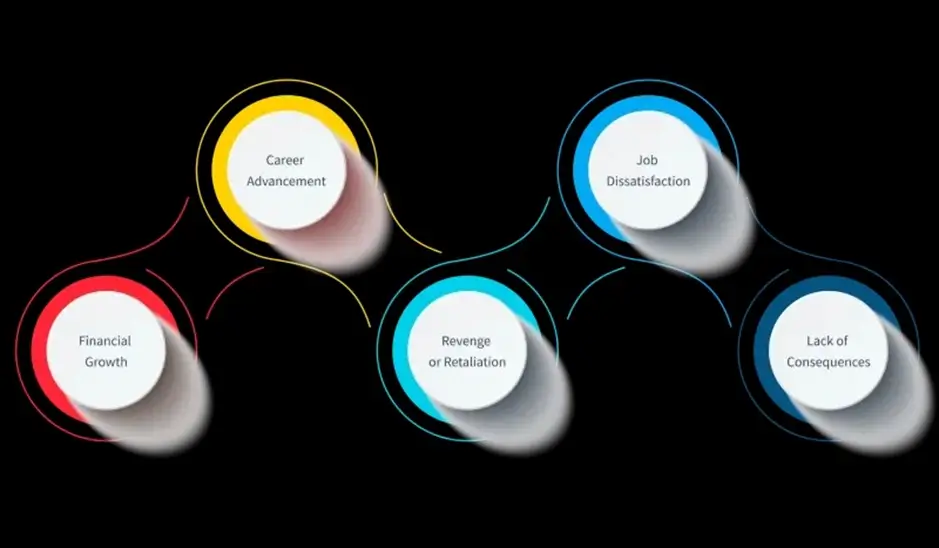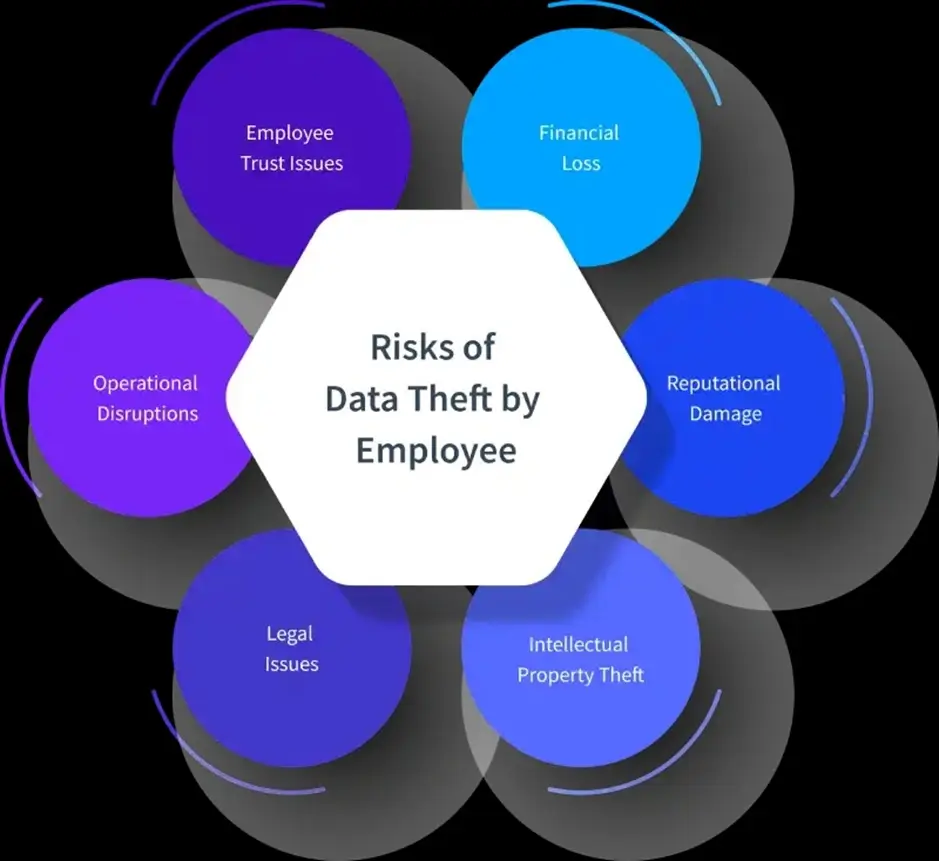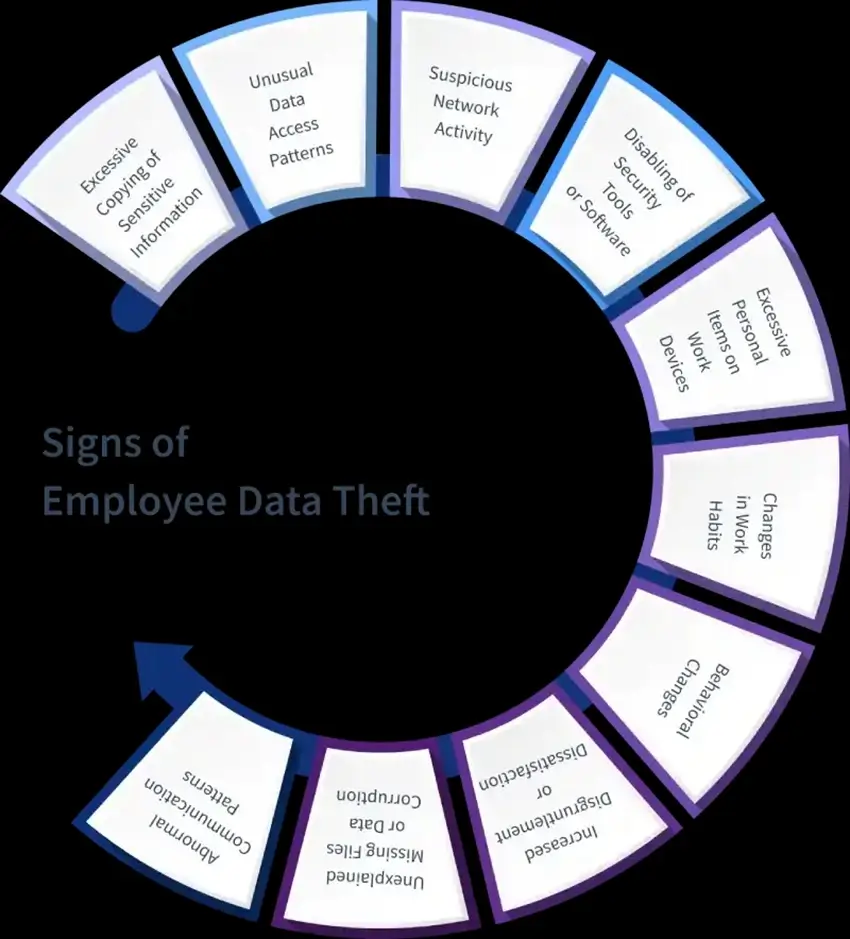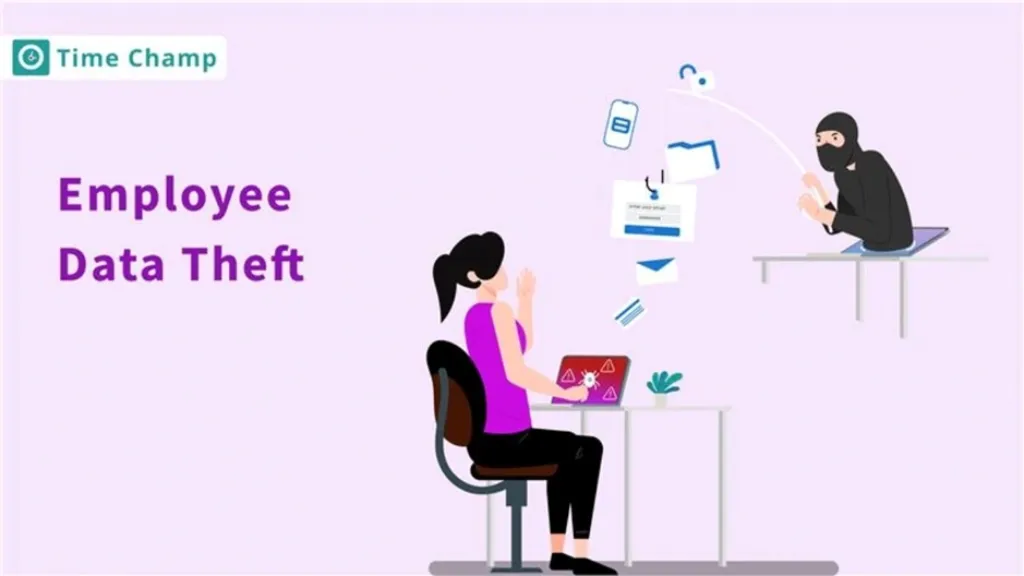Imagine a trusted employee secretly takes confidential company information and sells it to a competitor. Or worse, customer information leaks, leading to lawsuits and a damaged reputation.
Scary, right?
Employee data theft is a serious issue to businesses, with huge consequences. However, the major question that arises is, why would they even do this?
Is it revenge, financial gain, or weak security? Understanding these motives is the primary key to prevention. In this blog, we’ll discuss the reasons behind data theft, its risks, and most importantly how to stop it before it creates a disaster.
What is Employee Data Theft?
Employee data theft occurs when employees access, misuse, or transfer an organization’s confidential data without authorization. This can include sensitive information such as customer databases, trade secrets, financial records, or proprietary data. It can be intentional or accidental, such data breaches can definitely lead to serious consequences.
Why Employees Attempt Data Theft
Employees don’t steal data for no reason, there’s always something that drives them no matter what. Let’s have a quick look at some of the reasons.

Financial Growth
One of the primary reasons why employees steal data is to grow financially. To achieve this, they steal sensitive information like customer details, company secrets, or details that they sell to competitors or on illegal markets. There might be chances where a competitor offers them a huge amount to leak confidential information. Some employees may steal company data to start their own businesses, especially if they are facing financial difficulties or receive attractive offers from competitors.
Career Advancement
Some employees steal data as a way to quickly advance their careers. They may take client lists, project details, or business ideas to impress a new boss or get a head start on their own company. This usually happens when workers are planning to leave their job, feel unappreciated, or think they can’t grow in their current job. By taking this risky step, they hope to find better chances somewhere else.
Revenge or Retaliation
Workplace problems can really stir up bad feelings, and sometimes, employees turn to stealing data as a way to get back at the company. They might leak important information on purpose just to damage the company’s reputation or stir up trouble. This usually happens when things go south, such as facing trouble at work, losing their job, or having a strained relationship with their boss. It can also happen when employees feel left out, like when they bust their chops, but someone else gets the praise or rewards they think they earned. They may become a nuisance to the company and start misbehaving whenever they feel they are being treated unfairly.
Lack of Job Satisfaction
Unhappy employees who feel ignored or underpaid might steal data to get back at the company. They may think it’s okay because they feel they deserve more for their work. This can happen because of toxic workplaces, feeling left out or not being paid enough. When these feelings build up, some employees may feel justified in taking drastic actions, like stealing company data, as a way to "get even" or make up for what they feel they’re owed.
Lack of Consequences
In companies where data security isn't taken seriously, employees might feel there's little chance of getting caught if they steal information. If there’s no clear monitoring, no rules being enforced, or no real consequences for breaking the rules, it creates an environment where stealing data can easily happen. When employees don’t see any obstacles or fear of punishment, they’re more likely to take advantage of these security weaknesses, thinking they can easily get away with it.
Risks of Data Theft by Employee

Financial Loss
When employees steal data, it can create a big financial mess for the company. Stolen information can lead to fraud, spark costly investigations, and create huge legal problems. Even worse, if trade secrets or customer data end up with competitors, the company could lose key clients and business, taking a serious hit to its profits.
Reputational Damage
No one wants their sensitive information exposed to the public, right? So, when an employee steals data and leaves it out in the open, whether online or in some public space, it can really damage a company's reputation. Customers trust businesses to protect their personal data, and once that trust is broken, it's hard to get it back. It drastically results in a huge drop in business and potentially has legal consequences.
Intellectual Property Theft
If an employee steals important company information like patents, trade secrets, or software, it can hurt the business by causing loss of customers, legal problems, and high costs. If they share this data with competitors or use it to start a new business, the company may have a hard time staying ahead.
Legal Issues
Data theft can lead to serious legal problems if customer information, business secrets, or employee records are stolen. This can result in fines, lawsuits, and investigations under laws like GDPR, CCPA, or HIPAA.
Companies can also face trouble if they fail to protect important data. If stolen information is used for fraud or spying on other businesses, both the company and the employee involved may face criminal charges. Legal issues can be costly, slow down work, and damage customer trust.
Operational Disruptions
Data theft can seriously disrupt a company’s daily work. If important files are stolen, deleted, or changed, employees may struggle to finish tasks, causing delays and lower productivity. Security teams may also have to pause their work to investigate, slowing things down even more. In severe cases, systems may shut down, or some operations may stop to prevent further damage. Recovering lost data, improving security, and investigating the issue can take a lot of time and resources, affecting business growth.
Employee Trust Issues
When data theft happens within a company, it can damage trust among employees. They may start feeling uneasy about their colleagues, creating a tense work environment. In response, companies might increase monitoring to prevent future breaches. However, excessive surveillance can backfire making employees feel constantly watched, which can hurt morale and productivity.
Signs of Employee Data Theft
Employee data theft often leaves some warning signs such as unusual file access, secretive behavior, etc. Spotting these red flags early can help to prevent major damage.
Here’s what to watch for!

Excessive Copying of Sensitive Information
If an employee starts copying or printing files all of a sudden, then you should definitely check into this. Usually, employees copy some files for some work purpose, but for a standard limit. If the limit crosses, then it must be a sign of employee data theft.
There will be some warning signs such as downloading files outside of working hours, and accessing a large volume of data, especially files which aren’t relevant to their roles. The use of external storage devices such as USB drives or unauthorized cloud services to transfer files could be a major red flag.
Unusual Data Access Patterns
Employees usually access data relevant to their jobs, but what if they’re crossing the limit? If someone starts retrieving a large amount of data or regularly accessing restricted files without any justification, then you should check into this. Frequently looking into financial data, customer data beyond the line can lead to risk. Actions such as remote access from different locations, multiple login failure attempts, should be carefully monitored.
Suspicious Network Activity
Unusual network behavior, such as transferring a large number of files to external unauthorized devices, could indicate a sign of data theft. If any employee is using unauthorized VPN’s, encrypted messaging files, it may indicate that they’re trying to hide their online activities.
IT teams should look into this malicious behavior carefully. Teams should monitor network traffic, repeated attempts to bypass firewalls.
Disabling of Security Tools or Software
Employees who are trying to disable monitoring software, firewalls, etc. might be trying to remove some digital traces of their activities. This is a strong indication of malicious behavior, which means they want to bypass security controls.
It is important to implement strong policies that prevent unauthorized changes to security settings. Any behavior like disabling of any monitoring software should be immediately investigated, as it could be planned or ongoing data theft.
Limit Personal Use of Work Devices
It is fine to open some personal apps on work devices for any significant task, but storing sensitive data, sending confidential files to their personal drives, unapproved software, unauthorized applications could be a sign of data theft. It’s because they may contain some hidden files to store stolen company information.
It is advisable to do regular audits of company-issued devices as it helps to detect any unauthorized devices, information quickly. Strictly implement policies regarding using work devices for personal purposes beyond a reasonable limit.
Changes in Work Habits
A sudden change in an employee's habits such as staying late at the office, working at odd hours, or regularly accessing confidential files outside their usual scope, may indicate suspicious behavior.
Yeah, I understand, there may be some employees who genuinely need flexible working hours!
But, unexplainable changes should be monitored.
If an employee who usually follows normal work routines suddenly starts working alone or avoiding coworkers, it might be a sign that they are trying to hide something wrong. Employers should notice these changes and check if they make sense for the job or if they could be a security risk.
Behavioral Changes
Employees who steal data may start acting differently. They may become secretive about the work they do, avoid talking/discussing about the company policies, or get defensive when asked about what they are doing. If they suddenly seemed stressed, anxious, or nervous, they could be hiding something.
Managers need to observe employees who have sudden mood changes, seem less interested in work, or act nervous about IT security. While personal issues can also lead to these changes, they should not be ignored if there are other signs of suspicious behavior.
Increased Disgruntlement
Employees who feel undervalued, overlooked for promotions, or not satisfied with company policies may be more likely to engage in data theft. An upset employee might see taking important information as a way to get back at the company or to help them in a future job.
To reduce this type of risk, companies should always listen to employees' concerns and keep a positive work environment. They should also have clear rules to stop former employees from taking important data when they leave.
Unexplained Missing Files or Data Corruption
If important company files suddenly go missing, become corrupted, or are altered without explanation, it could be a sign of data theft or sabotage. Employees trying to hide their actions may delete or change records to erase proof of what they did.
To catch and fix these issues, companies should regularly back up files, track who accesses them, and keep records of changes. If data keeps going missing, it should be carefully checked to see if someone inside the company is responsible.
Abnormal Communication Patterns
Employees engaged in data theft may communicate suspiciously with external contacts, such as competitors or unknown third parties. Unusual communication methods such as overusing personal emails for work-related discussions, encrypted messaging apps, or secretive phone calls should raise concerns.
Employers should watch for secret company information being shared without permission through email, messages, or social media. If an employee suddenly starts talking more with people outside the company, especially with competitors, it should be checked to prevent important data from being leaked.
How to Prevent Employee Data Theft
I know this sounds alarming, but don’t worry! Employee data theft can be easily prevented by taking the right steps. Following these measures helps to protect the business and avoid costly breaches. Here’s how:

Implement Strong Access Controls
One of the best ways to prevent employee data theft is to implement strong access controls. Employees should only access the data they need for their jobs. Important files should be restricted to authorized personnel, and multi-factor authentication should be required for access.
Companies should regularly check and update who can access important data. This helps make sure that former employees or those with new job roles can no longer see private information. Using role-based access control (RBAC) and tracking logins can help spot any unauthorized attempts to access sensitive data.
Use Encryption for Sensitive Data
Encrypting important data makes sure that even if someone without permission gets access, they cannot read or use it. Data should be encrypted both when stored and when sent to keep it safe from hackers or dishonest employees.
Companies should use encryption for emails, databases, and file storage. Employees should also learn why it’s important to encrypt their personal and work devices, like USB drives and laptops, to prevent data leaks or theft.
Adopt a Data Loss Prevention System
A data loss prevention is a must-have in every organization. A Data> Loss Prevention (DLP) system helps track and control how important data moves within a company. It can automatically spot and block unauthorized attempts to copy, send, or upload confidential files, stopping data theft. DLP can also limit the use of external storage devices and unapproved cloud services.
By using DLP tools, companies set rules that send alerts when sensitive data is accessed or shared in a suspicious way. This helps the security team act quickly to prevent data leaks and protect company information.
Provide Regular Security Awareness Training
Many cases of data theft happen because employees don’t know about security risks or get tricked by scams. Regular security training helps employees recognize risks like scam emails, dishonest coworkers, and unsafe data handling.
The training should teach them how to keep data safe, follow company rules, and understand the results of data theft. When employees know their role in security, they are more likely to follow safety rules and report anything unusual.
Establish a Comprehensive Data Security Policy
A clear data security policy keeps important information safe. It should explain the rules for using, storing, sharing, and deleting data so all employees know what they must do. It should also include how to report security problems and what happens if someone breaks the rules.
The policy should be updated often to handle new risks and technology. Companies should make sure all employees, including new ones, understand and follow these rules through regular checks and reminders.
Establish a Clear Offboarding Process
When an employee leaves the company, a proper exit process is important to protect company data. Their access to emails, systems, and important files should be blocked immediately. IT teams should also make sure they return all company devices, storage drives, and documents before they leave.
An exit interview can help find any risks, and checking their last activities, like unusual file transfers or email forwarding, can prevent data theft. A clear exit process helps the company stay secure while making the transition smooth.
How Time Champ Prevents Employee Data Theft
Time Champ helps prevent employee data theft by providing real-time monitoring and activity tracking on company devices. It prevents data theft by blocking risky websites, USB devices, and file attachments while monitoring web activity, file changes, and USB connections in real time. Instant alerts and access controls stop unauthorized transfers, ensuring security, compliance, and data integrity.
Beyond monitoring, Time Champ promotes a culture of accountability by offering transparent tracking of employee actions without being intrusive. By implementing role-based access controls and monitoring software usage, companies can minimize insider threats while maintaining employee trust. By enforcing strict security policies, Time Champ helps organizations proactively prevent data leaks and unauthorized access.
Final Thoughts
In conclusion, employee data theft can cause financial loss, legal trouble, and damaged trust. It often happens due to greed, career growth, revenge, or weak security. Companies can prevent it with strong security, limited access, encryption, and employee training. A clear exit process also helps protect data. Taking these steps ensures safety and trust.
Frequently Asked Questions
- Section 66: Punishment includes up to 3 years in jail, a fine of ₹5 lakh, or both.
- Section 43: Liability for damages up to ₹1 crore.
Immediately revoke access, investigate the breach, inform affected parties, and take legal action if necessary.
Yes, if access is not revoked properly, ex-employees may misuse confidential data. A strong off boarding process helps prevent this.
Yes, AI-powered security tools analyze user behavior, detect anomalies, and alert companies to potential data theft risks in real-time.








